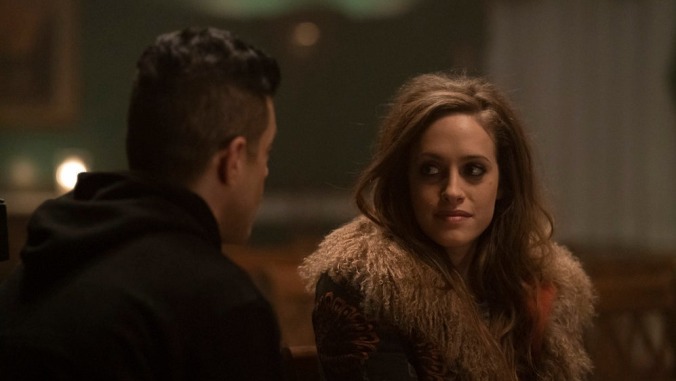It's all coming together as Mr. Robot reveals its biggest surprise since season 1


“I’m here!”
“No, you’re not!”—Elliot and Darlene, “Payment Required”
We should’ve known as much. Elliot isn’t all there. Mr. Robot even told us as much, last episode: He broke the normal rules, addressed us directly, and said that Elliot was shutting down, pushing people out, not letting himself be present. At the time, it seemed like a metaphor for his closed-off emotional state. But it was much more than that. Elliot literally wasn’t fully present. The reason a part of him has seemed missing is because a part of him is missing. There’s someone else that exists inside that slender frame, and we haven’t met them—at least not consciously. There’s a part of Elliot Alderson that has been waiting in the wings, keeping concealed from our sight. Elliot isn’t all there. We should’ve known.
A solid episode of Mr. Robot ended with the biggest rug-pull the show has done since its freshman year, and it wasn’t even a single tug. It yanked the rug out from under us, knocked us against the wall, stood us back up, and then yanked it again. Darlene tells Elliot that she informed him about Fernando Vera’s return a couple of months ago, when he first appeared. But it wasn’t Elliot—and crucially, it also wasn’t Mr. Robot, as he swears to Elliot in the funeral home. While Elliot and Robot stare at each other, the horrifying realization sinking in that they might be sharing their body with another person entirely, the show abruptly cuts to a corporate board room high in the sky. The same room, in point of fact, that Elliot was ushered into at the end of the very first episode back in season one, where he was greeted by Tyrell Wellick. Which is fitting, because we now see a young boy, spinning in an office chair, who looks remarkably like Tyrell as a kid. This boy comes to a stop when a woman enters the room and tells him he shouldn’t be sitting there, because he’s not ready yet. She says that first, they have to wait for him. “You mean Mr. Robot?” No. “Elliot?” “No. The other one.” And with that, she ushers them out.
Oh—and the woman looks exactly like Elliot’s mother from years earlier. The one who just died.
Anyone waiting for the show to start barreling toward its endgame didn’t need to wait long. “Payment Required” doesn’t just drop these two massive twists in its final moments; it kicks off with an info dump that might be the most straightforward exposé the series has ever done. Thanks to a monologue from Phillip Price, we’re walked through the beginnings of Whiterose’s plan: As Minister Zhang, she masterminded the formation of Deus some 25 years earlier, bringing together “the world’s wealthiest and most powerful men” to form a new investment group, one that would usher in a new world order, controlled by them. Only, as Price quickly admits, the members of this group soon realized they were “working for Zhang, not with him.” Price hasn’t just saved Elliot; he’s pulled back the curtain, sharing what he knows in hopes there might be a reckoning.
This is clear even before Elliot appeals to Price’s sense of justice. “Something inside you is telling you to stop looking the other way…that can start here,” he informs the E Corp CEO, and while it helps push Price to pressure Whiterose about calling a meeting of Deus’ members, the businessman had already made up his mind. He spared Elliot’s life. He brought him back to the AllSafe offices. And he regaled him with the story of the men pulling the levers of history, manipulating countries and peoples for power and profit—and ultimately, the construction of Whiterose’s mysterious machine. Price made his choice—and he’s throwing in with the underdogs.
The meat of the episode, however, is given over to the story of Elliot and Darlene. The siblings are trying to find their way back to each other, and their mother’s death provides the impetus to reconnect in a manner it seems they’ve been unable to since that fateful day in the Dark Army’s barn. She’s been tormenting herself with the knowledge of what she did to Susan Jacobs—what had previously seemed like cold-blooded murder, reaffirmed by Darlene when she mentioned how little she felt about it—now looks like it was a front, another attempt by Ellliot’s sister to convince herself she was more ruthless than she is. She hid what she had done from Elliot, all of it, worried what he might think about her were he to find out. If he’s not all there, she’s actively kept herself in pieces, refusing to let the damaged parts overwhelm the whole. Her story about how her brother would squeeze her hand when they were kids, to reassure him she was there and everything was real, didn’t just make him okay. It made her feel complete—something she desperately needs once more.
Dom, for her part, is playing the good soldier for the Dark Army. What initially looks like a moment of weakness, the FBI agent crumbling of the pressure of her meeting about Santiago, is soon revealed to be part of the plan. She uses her real suspicions that her former boss was a double agent to then plant the false accusation that Santiago worked for a drug cartel, throwing the agency off the Dark Army’s scent. But it’s not enough—as Janis (the new Irving, really) tells her, 99.9% sure isn’t good enough. Dom has to keep it 100—otherwise, people like Horton, the man who took her story, will get thrown off a building and have the death framed to look like a suicide.
This season is bringing together the symbolism and allusions from all the previous ones combined. If the premiere last week recouped the tone and mood of the first season, all hushed, tense adrenaline and bleak views of humanity, then this episode drew on imagery from season two, which highlighted concepts of faith and deities. Just look at the above shot: Elliot, down below the Christian symbol of God, looking away from the promise of salvation. That season repeatedly turned to the idea of the self as a kind of god—Tyrell and his “we could be gods,” Elliot’s therapy-group indictment of belief—and this year it comes back, just so Elliot can turn away from it. He no longer wants that; he wants revenge. And the references to time that have suffused the series became literally embodied in characters who are supposedly dead and gone. When Angela went to the suburbs and spoke to the strange girl in season two, the one who prepped her to accept Whiterose’s plan, the actor who played the young child, Mabel Tyler, was the same one who played Angela as a kid in an episode the following season. And now we get Elliot’s mother, and what looks for all the world like a young Tyrell. We’re not going back in time; time is coming forward to us.
Like the walkman containing a cassette that transports Elliot and Darlene back to the time when they, along with Angela, made up fake broadcasts of themselves—the innocence of children still too young to realize what’s to be taken from them—this episode raises the ghosts of Mr. Robot past. Elliot and his sister may be somewhat relieved that their mother is finally dead, her cruelties now forever in the past, but as the show has continually reminded them, the past is rarely done with us. It extracts a heavy toll—one that Elliot, as Mr. Robot says, isn’t willing to pay. But his sister will be there to remind him, and the meta narrative of this whole series, that revolution and revenge will never have the emotional impact of a family member, for good and ill. Especially ill—because if anyone knows what it feels like right now to not be all there, it’s Elliot. 99.9% isn’t good enough.
Stray observations
- As heavy as the emotional drama got this episode, the script kept it sharp and incisive, with some excellent comedic beats. To wit: Mr. Robot failing to coax Elliot into opening up and acknowledging some grief about the situation, leading to Elliot storming off and Robot ruefully addressing us: “I agree. That could’ve gone better. Fuck you.”
- Another excellent use of the f-bomb: Darlene, upon being told the safe deposit box their mother had taken out had been disposed of after two years of non-payment. “What the fuck is wrong with you!?” she screams. Cue a very uncomfortable bank employee: “I’ll…uhh….give you a few minutes?”
- And the zingers keep on coming! Phillip Price, to Whiterose in her appearance as Zhang, about the Christmas decor: “You’re a little unbalanced…your tree.”
- Welcome to Janis’ business, La Morte Heureuse Taxidermy. “La Morte Heureuse” is “The Happy Death” in French, the name of Albert Camus’ posthumously published novel about a man in search of happiness, and the need for money to gain enough time to achieve it. Check this quote: “We use up our lives making money, when we should be using our money to gain time.”
- A special shout-out this week to commenter Andy Bell, who I believe was the first to call attention to what turned out to be a spot-on assessment of this season’s titles: They’re HTTP Status codes, specifically 4XX Client Errors.